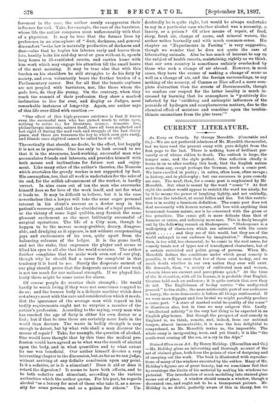CURRENT LITERAT URE.
An Essay on Comedy. By George Meredith. (Constable and Co.)—We are not perfervid admirers of Mr. Meredith the novelist, but we have read the present essay with pure delight from the first page to the last. There is nothing here of brilliant per- versity or of whims ridden to death. The outlook is large, the temper sane, and the style perfect. One reflection chiefly is borne in on us after reading this book, that the English nation more than any, except perhaps the German, needs a comic poet. We have excelled in poetry ; in satire, often keen, often savage ; in history, and in philosophy ; but our successes in pure comedy are rare. The need, then, for a comic poet is emphasised by Mr Meredith. But what is meant by the word " comic " P At first sight the author would appear to restrict the word too nicely, for by it he means the power of laughing lightly, and not unkindly, and from the intellect, at social follies and lies. Yet this restric- tion is in reality a luminous definition. The comic poet does not deal necessarily with human nature, still less with anything that transcends human nature, nor is he concerned with the gross or the primitive. The comic gift is more delicate than that of humour or satire, and infinitely more rare. This is finely brought out by the following remark on Shakespeare. "Shakespeare is a well-spring of characters which are saturated with the comic spirit and they are of this world, but they are of the world enlarged to our embrace by imagination." Shakespeare, then, is too wild, too elemental, to be comic in the real sense, for comedy treats not of types nor of transfigured characters, but of a certain restricted and polite group of persons. When Mr. Meredith defines the conditions under which great comedy is possible, it will be seen that few of them exist to-day, and we much doubt whether in our own nation they ever will exist. He demands, then, "a society of cultivated men and women, wherein ideas are current and perceptions quick." At the time of the Restoration, with all its license, it is probable that English theatres held such an audience ; it is quite certain that now they do not. The Englishman of to-day carries "the undigested peacock" to the stalls; the more aristocratic part of our audiences is heavy, the more democratic is before all things sentimental. If we were more flippant and less brutal we might possibly produce a comic poet. "A state of marked social inequality of the sexes" is disastrous also, but in time we may outgrow this. Lastly, "intellectual activity" is the very last thing to be expected in an English play-house. But though the prospect of real comedy in England is, we think, remote, and, indeed, from our national temper, almost inconceivable, it is none the less delightful to comprehend, as Mr. Meredith makes us, the impossible. The whole essay is invigorating, keen, and yet bland ; it is like "the south-west coming off the sea, or a cry in the Alps."


































 Previous page
Previous page